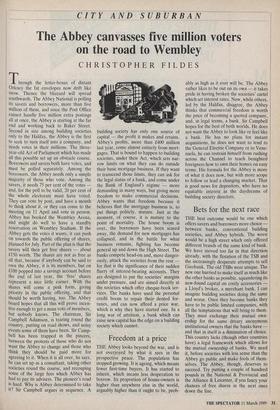Freedom at a price
THE Abbey looks beyond the war, and is not overjoyed by what it sees in the prospective peace. The population has stopped growing. It is ageing, which means fewer first-time buyers. It has started to inherit, which means less desperation to borrow. Its proportion of house-owners is higher than anywhere else in the world, arguably higher than it ought to be, prob- ably as high as it ever will be. The Abbey rather likes to be out on its own — it takes pride in having broken the societies' cartel which set interest rates. Now, while others, led by the Halifax, disagree, the Abbey thinks that commercial freedom is worth the price of becoming a quoted company, and, in legal terms, a bank. Sir Campbell hopes for the best of both worlds. He does not want the Abbey to look like or feel like a bank. He has no plans for instant acquisitions, he does not want to lend to the General Electric Company or to Vene- zuela, he can restrain himself from rushing across the Channel to teach benighted foreigners how to own their homes on easy terms. His formula for the Abbey is more of what it does now, but with more scope to follow or lead a changing market. That is good news for depositors, who have no equitable interest in the daydreams of building society directors.


























































 Previous page
Previous page